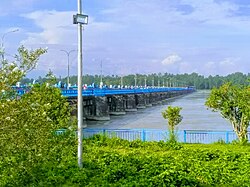Hatibandha (Bengali: হাতিবান্ধা) is an upazila of Lalmonirhat District[3] in Rangpur Division, Bangladesh.
Hatibandha
হাতিবান্ধা | |
|---|---|
 Teesta Bararge, Hatibandha | |
 | |
| Coordinates: 26°6.8′N 89°8′E / 26.1133°N 89.133°E | |
| Bangladesh | |
| Division | Rangpur |
| District | Lalmonirhat |
| Area | |
| • Total | 288.42 km2 (111.36 sq mi) |
| Population | |
| • Total | 264,107 |
| Time zone | UTC+6 (BST) |
| Postal code | 5530[2] |
| Website | Official Map of Hatibandha |
Geography
editHatibandha is located at 26°06′45″N 89°08′00″E / 26.1125°N 89.1333°E. It has 53,122 households and total area 288.42 km2.
Demographics
editAccording to the 2011 Census of Bangladesh, Hatibandha Upazila had 53,122 households and a population of 233,927. 59,558 (25.46%) were under 10 years of age. Hatibandha had a literacy rate (age 7 and over) of 45.30%, compared to the national average of 51.8%, and a sex ratio of 1002 females per 1000 males. 9,476 (4.05%) lived in urban areas.[5][6]
As of the 1991 Bangladesh census, Hatibandha has a population of 172,417. Males constitute 51.39% of the population, and females 48.61%. This upazila's eighteen up population is 85,064. Hatibandha has an average literacy rate of 21.4% (7+ years), and the national average of 32.4% literate.[7]
Administration
editHatibandha Upazila is divided into 12 union parishads: Barokhata, Dawabari, Fakirpara, Goddimari, Gotamari, Nowdabas, Paticapara, Shaniajan, Sindurna, Singimari, Tongvhanga, and Vhelaguri. The union parishads are subdivided into 63 mauzas and 65 villages.[5]
See also
editReferences
edit- ^ National Report (PDF). Population and Housing Census 2022. Vol. 1. Dhaka: Bangladesh Bureau of Statistics. November 2023. p. 403. ISBN 978-9844752016.
- ^ "Bangladesh Postal Code". Dhaka: Bangladesh Postal Department under the Department of Posts and Telecommunications of the Ministry of Posts, Telecommunications and Information Technology of the People's Republic of Bangladesh. 21 October 2024.
- ^ Sirajul Islam; Miah, Sajahan; Khanam, Mahfuza; Ahmed, Sabbir, eds. (2012). "Hatibandha Upazila". Banglapedia: the National Encyclopedia of Bangladesh (Online ed.). Dhaka, Bangladesh: Banglapedia Trust, Asiatic Society of Bangladesh. ISBN 984-32-0576-6. OCLC 52727562. OL 30677644M. Retrieved 15 November 2024.
- ^ Population and Housing Census 2022 - District Report: Lalmonirhat (PDF). District Series. Dhaka: Bangladesh Bureau of Statistics. June 2024. ISBN 978-984-475-253-5.
- ^ a b "Bangladesh Population and Housing Census 2011 Zila Report – Lalmonirhat" (PDF). Bangladesh Bureau of Statistics.
- ^ "Community Tables: Lalmonirhat district" (PDF). Bangladesh Bureau of Statistics. 2011.
- ^ "Population Census Wing, BBS". Archived from the original on 2005-03-27. Retrieved November 10, 2006.